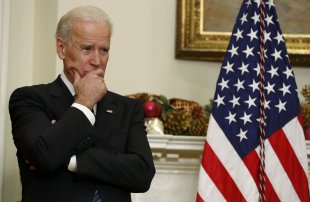PESHAWAR, Pakistan (AP) — Gunmen in northwest Pakistan killed five female teachers and two aid workers on Tuesday in an ambush on a van carrying workers home from their jobs at a community center, officials said.
The attack was another reminder of the risks to women educators and aid workers from Islamic militants who oppose their work. It was in the same conservative province where militants shot and seriously wounded 15-year-old Malala Yousufzai, an outspoken young activist for girls' education, in October.
There was no immediate claim of responsibility for the latest shootings.
In another attack likely by militants in the southern city of Karachi, four people were killed and dozens injured when a bomb went off just as a large political rally was dispersing.
The teachers and aid workers in the northwest were killed Khyber Pakhtunkhwa province. It is an area where Islamic militants often target women and girls trying to get an education or female teachers.
Militants in the province have blown up schools and killed female educators. They have also kidnapped and killed aid workers, viewing them as promoting a foreign agenda.
Last month, nine people working on an anti-polio vaccination campaign were shot and killed. Four of those shootings were in the northwest as well.
Khyber Pakhtunkhwa province, formerly called the Northwest Frontier province, borders the tribal areas of Pakistan along the frontier with Afghanistan to the west. Militant groups such as the Taliban have used the tribal areas as a stronghold from which to wage war both in Afghanistan and against the Pakistani government. Often that violence has spilled over into the mostly Pashtun province of Khyber Pakhtunkhwa.
In 2007, the Taliban led by Maulana Fazlullah took over the scenic Swat Valley, marking the height of their strength there. The Pakistani military later pushed the militant group from the valley but the Taliban has repeatedly tried to reassert itself.
The teachers were killed along with two health workers, one man and one woman. Their driver was wounded. They were on their way home from a community center in the town of Swabi where they were working at a primary school for girls and adjoining medical center.
The injured driver told investigators that the gunmen stopped the vehicle and removed a boy — the son of one of the women — before indiscriminately opening fire, said police officer Fazal Malik.
Swabi police chief Abdur Rasheed said most of the women killed were between the ages of 20 and 22. He said four gunmen who used two motorcycles fled the scene and have not been apprehended.
The gunmen on motorcycles opened fire with automatic weapons, said Javed Akhtar, executive director of the non-governmental organization Support With Working Solutions. The NGO conducts programs in the education and health sectors and runs the community center in Swabi, he said. The group has been active in the city since 1992, and started the Ujala Community Welfare Center in 2010, he added. Ujala means "light" in Urdu.
The center is financed by the Pakistani government's Poverty Alleviation Program and a German organization, said Akhtar.
He said the NGO also runs health and education projects in the South Waziristan tribal area, as well as health projects in the cities of Tank and Dera Ismail Khan and the regions of Lower Dir and Upper Kurram. All of those cities and regions are in northwest Pakistan, the area that has been most affected by the ongoing fight with militants opposed to the current government.
Aid groups such as Support With Working Solutions often provide a vital role in many areas of Pakistan where the government has been unable to provide services such as medical clinics or schools. In some areas like the northwest, they have had to work to overcome community fears that they are promoting a foreign agenda at odds with local traditions and values.
But many local residents in Swabi said the school and medical center provided a vital service to the community and mourned those who were killed.
Murad Khan said his daughter was studying at the primary school, which provided free books and uniforms to students. He said many people in the area are now worried that the school and clinic will close.
"This school is like a gift for all of us, the poor people of the village," he said. "People in our area are sad."
The NGO director said he has directed staff at all projects to stop working for the time being until security measures are reviewed but vowed that they would resume their work soon.
He said that the NGO had not received any threats before the attack.
In Karachi, senior police officer Asif Ejaz Shaikh said the bomb that killed four was planted in a motorcycle parked amid a crowd of buses for political workers returning from the rally held by the Muttahida Qaumi Movement. The MQM is the dominant political party in Karachi.
There was no immediate claim of responsibility for the attack.
The provincial health minister Dr. Saghir Ahmed said four people were killed and 41 injured.
__
Associated Press writers Zarar Khan in Islamabad and Adil Jawad in Karachi contributed to this report.



